Full & Partial Dentures – Lynchburg, VA
Replacing Missing Teeth For a Fully Functioning Smile

The American College of Prosthodontists estimates that about 40 million Americans are missing all of their teeth. That means that if you’re suffering from having gaps in your smile, you’re not the only one. At Peery & Woolwine Family Dentistry, we hope to restore the function and feel of two completed arches of teeth with customized restorations, such as full and partial dentures. By restoring your grin, you’ll be able to boost your self-confidence while also improving your ability to complete daily functions such as chewing food. If you would like to learn more about how your dentist in Lynchburg can provide you with a full smile again, don’t hesitate to contact our office!
Why Choose Peery & Woolwine Family Dentistry For Dentures?
- High-Quality Dental Materials Used
- Customized & Natural-Looking Restorations
- In-Network Provider For Most PPO Plans
Who’s a Good Candidate for Dentures?

Whether you’re missing a couple of teeth or a whole dental arch, dentures are a possibility for almost anyone. At Peery & Woolwine Family Dentistry, our mission is to help you receive the treatment you need. Your dentist is more than happy to create a customized plan to help you reach your goals. So, even if you aren’t a candidate now, your dentist will work with you one-on-one to ensure you achieve the smile of your dreams. To see what it takes to get some of our high-quality dentures, continue reading below.
Effects of Missing Teeth

Your teeth are rooted in your jawbone, and though they are coated with the hardest substance in your body, they are vulnerable to damage from many sources:
- Bacterial plaque that weakens enamel causes dental decay.
- Contact sports and household accidents can crack or knock out teeth.
- As teeth age, they can wear down and become damaged with time.
- Gum disease can weaken the connective tissues around the root of the tooth and cause them to fall out.
No matter how you lose your teeth, the consequences are largely the same: difficulty chewing, speaking, and smiling. Even your jawbone can begin to deteriorate due to a lack of stimulation, causing other issues like skin sagging, a sunken appearance, and lowered self-esteem.
What Qualifies You for Dentures?
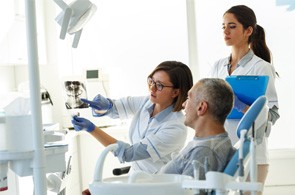
Dentures can vastly improve your quality of life in many ways, and almost anyone can qualify for them. But what is your dentist looking for in a good candidate? If you have healthy gums, a dense enough jawbone, and are committed to keeping up with your oral hygiene, dentures may be a solid choice for you.
However, to confirm your eligibility and explore your options, you’ll need to schedule a consultation with us. During this visit, we’ll discuss your goals, assess your oral health, and consider your budget to find a solution that meets your needs. Whether it's partial or full dentures, our team will guide you to the ideal choice for your unique situation.
Alternative Tooth-Replacement Options
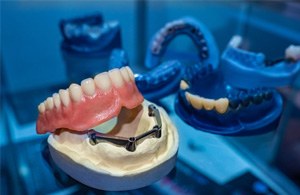
If you discover that dentures aren’t the best fit for you during your consultation, you aren’t out of luck. There are other options that can help you combat tooth loss, such as:
- Dental Bridges: If you’re only missing one or two teeth in a row, a dental bridge could be an effective solution for you. This is a set of crowns attached to a pontic—a false tooth. The adjacent teeth are shaped and will have the crowns bonded to them, creating a single fixed piece.
- Dental Implants: These are the latest and greatest in dental technology. An implant fixture made of titanium is surgically implanted into your jaw. This creates a sturdy anchor for many types of prosthetics, including singular crowns, bridges, or even dentures!
So, there’s no need to worry about the future of your smile. At Peery & Woolwine Family Dentistry, you have options, and your dentist will guide you through the entire process from start to finish. If you’re ready to dive into dentures, contact us and set up your denture consultation.
How Dentures are Made

Once you start considering dentures, you may wonder how they’re made. It’s only fair that you know what went into your new teeth, right? Still, facts about denture creation can sometimes be hard to find. To simplify things, below is a summary of how dental labs make dentures. Feel free to use it and learn just how our restorations come to be. Otherwise, please call our office to get the relevant details.
What are Dentures Made Of?

Whether it’s a full or partial type, every denture has two essential parts: the base and the artificial teeth. It’s only when these pieces come together that they form a working restoration. So, consider their features as described:
- Denture Base – A denture’s base is the foundation that supports its artificial teeth. This component is often of acrylic, nylon, or metal, though acrylic is the most common material. Still, partial dentures may use nylon or metal at times.
- Artificial Teeth – The artificial teeth are (per their name) the tooth-replacing portions of a denture. Most are made from enamel-colored resin or porcelain, with porcelain being the more popular material due to its looks.
The Denture Creation Process

Each denture is custom-made for the patient’s mouth, so making one requires a multi-step process. The steps involved are the following:
- Step 1: Our dentists will take a dental impression of your mouth. Using that impression, they’ll make a plaster model that matches your future denture’s size and shape.
- Step 2: We’ll send the plaster model to a lab, which will use the model to create a wax gumline.
- Step 3: After making the wax gumline, lab workers will set artificial teeth in it. This step leads to a prototype denture used to make the final one.
- Step 4: We’ll receive the prototype denture and see if it fits. From there, we’ll return it to the dental lab that crafts the restorations.
- Step 5: After boiling the denture to remove its wax, a worker will place it in a flask. This flask will receive plaster and sit in hot water.
- Step 6: A separator will go into the plaster layer, keeping the acrylic from sticking. This latter material will be injected into the flask to replace the wax.
- Step 7: The lab worker will remove all plaster to reveal the denture. Later, they’ll place the restoration in a bath to remove residue.
- Step 8: The worker will cut off the denture’s excess acrylic, followed by briefly polishing it.
- Step 9: You will have your final denture fitted. At that time, the dentist will adjust it to work smoothly.
Adjusting to Your New Dentures

When you first get dentures, you’ll likely feel a bit of discomfort. That’s normal – your mouth will need time to get used to your new teeth. After a while, the prosthetics will be more familiar and won’t cause any aches; they’ll feel like your other teeth.
All that said, you can speed up the adjustment process. One option is to exercise your facial muscles, strengthening them so they can handle your dentures better. Others include eating soft foods to avoid pain or using an adhesive. Through such methods, you’d get used to dentures even sooner.
If your denture discomfort persists, please call our office. It may be that your new appliance needs further alterations.
Partial Dentures
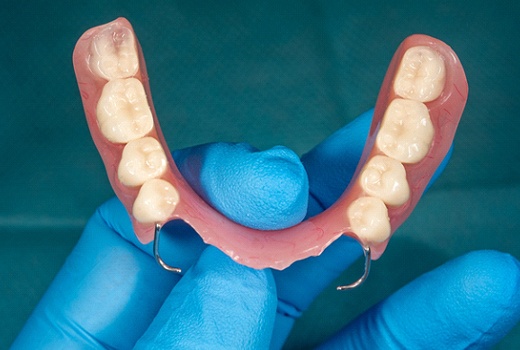
If you’re missing several teeth along an arch, partial dentures are likely the best restorative solution for you. The prosthetic consists of a metal or acrylic foundation that secures the replacement teeth between your natural ones, a gum-colored base, and artificial teeth custom-crafted from natural-looking porcelain or ceramic. The denture is removable, allowing you to easily sanitize it and provide your gums with a break whenever they need it.
Full Dentures
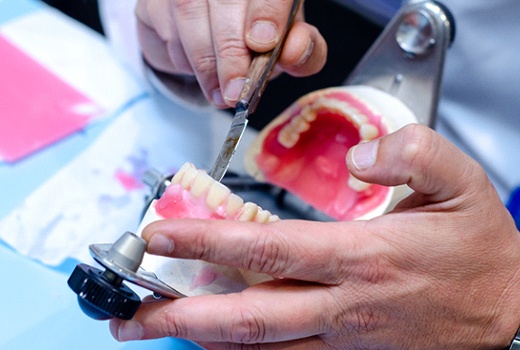
For our patients who are missing an entire arch of teeth, we’ll likely suggest a pair of full dentures. These are also comprised of a gum-colored acrylic base and replacement teeth, but instead of having a foundation built to fit around existing teeth, it’s made to secure to your gums. They utilize a clever design that harnesses the power of natural suction to stay securely in place. You can also use denture adhesive for improved stability. These are easily removable for added convenience. For our patients who are looking for a more permanent and unwavering solution, we also offer dental implants.
The Benefits of Dentures

Tooth loss isn’t a minor issue you can harmlessly ignore. When left untreated, it harms oral health and makes everyday life challenging. The upside is dentures can easily treat this condition and restore your full smile. You’d then see a large boost in your quality of life. As for the specific details, Peery & Woolwine Family Dentistry will gladly explain. Simply keep reading to learn the benefits of dentures, or call us soon.
Psychological Benefits

Losing teeth can have harsh effects on your mental health. Over time, the situation may leave you insecure and ashamed of your looks. You could easily start withdrawing from social life as a result. That process could prompt you to bear strong sadness or even clinical depression.
Thankfully, dentures can prevent this dip in your mood. Wearing them would fill your so-called “smile gaps” and make you confident in your appearance. From there, you’d feel much more at ease in social situations. You won’t have to worry about how you appear and can simply enjoy the company.
Clearer Enunciation

The simple truth is that people need teeth to speak clearly. Unless you have most (if not all) of them, your tongue can’t position itself to enunciate words well. Any efforts to talk would just lead to speech impediments – lisps, slurred words, etc.
Of course, dentures could bring back your clear speech. They’re designed to replace your missing teeth with artificial ones. As a result, your tongue could depend on them to enunciate words. You’d need to practice a bit first, though. It takes time and patience to speak well with dentures.
Improves Nutrition

Missing teeth lead to a poor diet when they go untreated. As your mouth loses its chompers, it becomes less able to chew properly. This reduced ability can force you to give up tough but healthy meals. The ultimate result is then a higher risk of malnutrition and indigestion.
Still, dentures let you skip this nutritional issue. Their artificial teeth let you chew food nearly as well as natural ones. That means they’ll expand your potential dietary choices. This wider range of foods will then improve your nutrition.
Preserves Oral Health

When you lose teeth, your smile’s health takes a major hit. The “smile gaps” created from tooth loss let harmful bacteria build up in your mouth. These microbes put you at high risk of cavities and gum disease. Worse, the gaps could also tilt your remaining teeth until they fall out.
Luckily, dentures defend against such oral damage. They fill your smile gaps and thus keep harmful bacteria from breeding too much. Similarly, their weight can at least slow the tilting rate of your other teeth.
Expands Opportunities

You’re likely aware that a pretty smile leads to better first impressions. By showing off white and aligned teeth, your peers will think well of you. Well, these good first impressions can also lead to grand opportunities. Strong connections with others often result in amazing friendships, lovely dates, high-paying work, etc.
As it happens, dentures transform your smile enough to improve first impressions. They can make your grin gorgeous enough to draw positive feelings. That way, friends, family, and others will be more eager to share good opportunities with you. You’ll then get to have a much richer life.
Understanding the Cost of Dentures

The cost of dentures in Lynchburg should never prevent you from replacing your missing teeth. We offer various financial solutions to keep your new smile within your budget. After examining your mouth and learning more about your preferences, we’ll create a personalized strategy to rebuild your smile. Don’t worry, a member of our team will explain everything, so you’ll know exactly what you’ll have to pay before committing to anything.
Factors that affect the Cost of Dentures

Every smile is unique, which is why a one-size-fits-all denture just won’t do. Various factors affect the amount you’ll pay for dentures in Lynchburg. When creating your estimate, you can expect it to include:
- Prep-Work: It’s not unusual to need a few preparatory treatments to ensure your smile is healthy, like periodontal therapy, tooth extractions, or bone grafting.
- Number of Teeth: The number of teeth you’re replacing will indicate the type of denture you need. You can expect to pay more to treat both arches.
- Type of Denture: Our office offers both traditional dentures and implant-retained solutions.
- Materials: There are discounted materials, but they’ll cost you more in the long run. Your denture dentist in Lynchburg will help you choose a high-quality material for a long-lasting investment.
Are Implant Dentures More Expensive?

Implant dentures cost more than the traditional method, but for good reason. They can last for a lifetime with the right aftercare, so you’ll never have to pay for replacements. As a result, they can pay for themselves. Not to mention, dental implants keep your jawbone strong to preserve your oral health. You’ll avoid many common issues associated with tooth loss to reduce your overall dental expenses.
Although dental implants may cost more initially, they are more affordable than many people realize. You won’t have to pay the entire balance at once because the process occurs in several steps that can take many months to complete. This can give you more time to pay off your smile.
Does Dental Insurance Cover Dentures?

Every insurance policy differs, but most dental plans offer coverage for dentures. It’s rare for dental insurance to pay the entire amount, but your benefits can cover up to 80% of the costs for certain steps in your treatment plan. After reaching your deductible, you can use your annual allowance to lower your out-of-pocket expenses. We know dental insurance can be confusing, but we’re here to help. A member of our team will maximize your dental insurance to keep dentures within your budget.
Other Options for Making Dentures Affordable

Dental insurance isn’t your only option to pay for dentures. We offer various financial methods, including:
- Traditional Payments: Our office accepts cash, checks, and credit cards.
- Third-Party Financing: Pay for your dentures using monthly installments through a third-party financing company.
If you have any questions about using your insurance or payment options, we’re only a phone call away. Contact our office today to speak with a member of our team to start your journey to a complete smile.
Dentures Aftercare

We design each set of dentures from our Lynchburg office to be incredibly comfortable, durable, and reliable, but it’s still important for you to take excellent care of your appliance so it can work well, look great, and last for as long as possible. It’s still crucial to see our dentists regularly even if you are missing all your natural teeth so they can monitor your mouth and address any problems in their early stages. Here’s a brief guide to what you can do to keep your dentures in excellent condition.
Removable Dentures

Remove After Eating
Remove and thoroughly rinse your dentures after each meal to prevent accumulations of plaque and food debris. However, don’t use hot water, as this can warp your dentures and ruin the way they fit.
Clean Your Restoration
It’s crucial to thoroughly clean your dentures once a day. Begin by removing your appliance and gently brushing it with a soft-bristled toothbrush and a small amount of mild dish soap, unscented hand soap, or denture cleanser. Don’t use regular toothpaste since it is abrasive enough to scratch your appliance. If you’re not wearing your dentures right away, be sure to soak them in a container of water or denture-cleansing solution to prevent them from drying out. After soaking, always thoroughly rinse your dentures so your mouth is not exposed to harsh cleaning agents.
Keep Your Dentures Safe
When you clean your dentures, fill your sink with lukewarm water and cover your countertop with folded towels to create a cushion in case you drop them. When not wearing your dentures, always keep them beyond the reach of pets and small children.
Remove Dentures When You Sleep
Continuous denture wear restricts circulation in your gums and allows food debris to accumulate beneath your appliance, which can lead to oral infections and possibly pneumonia. To prevent this, it’s important to remove them for at least eight hours every day. Always soak your dentures in water or a denture-soaking solution when not wearing them to prevent them from drying out and warping.
Notice Changes
Pay attention to how your dentures look and feel and bring anything unusual to our dentist’s attention. A few signs that your appliance needs to be repaired or replaced include shifting, sliding, popping, clicking, irritation, and oral pain. Never attempt to replace your dentures on your own, as this may ruin your appliance or even cause injuries.
All-on-4 Dentures
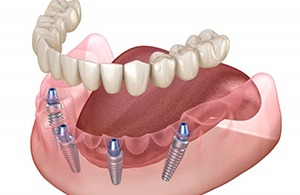
Brush your all-on-4 dentures twice a day using non-abrasive toothpaste and a manual or electric toothbrush with soft bristles. Don’t use products containing stain-removing agents like baking soda or charcoal, as these can scratch your appliance. Carefully floss your replacement teeth once a day, and you can use floss threaders or a water flosser to make flossing beneath your appliance easier. You may also wish to use a sulcus brush that is one-third the width of a normal toothbrush, which makes it great for cleaning beneath your dentures. You should also rinse with antibacterial mouthwash every day to prevent the growth of tartar.
Denture FAQs
Can I sleep with my dentures?
Your denture dentist in Lynchburg will instruct you to wear your new teeth for the first 24 hours, but then you will have to take them out nightly. Your dentures will restrict blood circulation to your gums, which can lead to sores, inflammation, and infections if they aren’t given time to recuperate. Taking your dentures out allows the soft tissues to get the vital nutrients they need to stay healthy. Not to mention, your mouth is a dark and moist environment. Harmful oral bacteria can multiply quickly, leading to complications that can affect your oral and general health. It can also shorten the lifespan of your denture. You can safeguard your health and investment by removing and cleaning your dentures nightly. Keep them in a denture-soaking solution whenever they aren’t in your mouth because they must be kept moist. If they dry out, they can warp or break.
Should I use toothpaste to clean my dentures?
Although your dentures will replicate your real teeth, you don’t want to use regular toothpaste to clean them because it’s abrasive. It’s better to use a soft-bristled toothbrush and mild hand soap or dishwashing liquid to clean them to avoid scratching your new teeth. Food particles and bacteria can get trapped in the crevasses, leading to odors, damage to the restoration, and cosmetic blemishes. When cleaning your dentures, don’t use hot water to prevent warping. You can also purchase OTC cleaning kits designed for dentures.
Will dentures change the shape of my face?
Dentures can turn back the clock to restore a youthful appearance. Your teeth are important for more than a beautiful smile. They also give your facial muscles support. Significant tooth loss can cause the facial tissues to sag, making you look years older than your chronological age. Dentures will reinstate the infrastructure they need to improve wrinkles and sagging skin. However, if your dentures don’t fit correctly, it’s important to have them relined or replaced to ensure your facial tissues continue to have the support they need to always look your best.
Can I still eat steak with dentures?
Your dentures will allow you to eat many of your favorite foods again, including steak. Although it’s possible to eat tough meats, it puts more wear and tear on the prosthetic. Since they require a lot of chewing, it can also lead to tenderness of the gums or jaw pain. You can still enjoy a juicy steak occasionally; however, tenderize it before cooking it. Cutting your food into small pieces will make it easier to chew and put less strain on your dentures and mouth.
Do Dentures Break Easily?
When we encourage patients to handle their dentures with care, it’s not because they are fragile. In fact, they can last for upwards of a decade. The reality is that habits like using a non-abrasive toothpaste and cleaning them over a soft towel significantly reduce the chances of scratches, chips, and other forms of damage, so incorporating them into your daily routine can help prolong their lifespan (protecting the time and money you invested in the process).
Am I Too Young to Get Dentures?
There’s a common misconception that dentures are only for seniors, but that’s not the case! The truth is that roughly 66% of adults between the ages of 40 and 64 are missing at least one tooth, and 33% of adults between the ages of 20 and 39 are in the same boat. Instead of adjusting to life with an incomplete smile and a limited diet, patients can face tooth loss head-on with modern dentures, which are custom-made to look and feel completely natural.
Is It Hard to Talk with Dentures?
In the beginning, you may find it a bit difficult to enunciate clearly with dentures. Don’t worry – the adjustment period is relatively short. Plus, you can adjust even faster with practice! We encourage our patients to take any opportunity they can to practice – from reading the back of their shampoo bottles to talking on the phone with a trusted friend. Remember to be patient with yourself throughout the process and to repeat more difficult words as you come across them. Before you know it, you’ll sound like yourself again.
Why Do My Dentures Smell?
Oftentimes, it’s the result of dental hygiene (or a lack thereof, more specifically). So, committing to good habits, like cleaning them with a soft-bristled toothbrush and non-abrasive toothpaste, is a great place to start. If that doesn’t seem to do the trick, shift your focus to your diet. Instead of eating fish, garlic, pickles, and other pungent foods, add more plain, nutrient-dense options to your plate, like yogurt, oatmeal, and bananas. If you feel like you’ve tried everything, but nothing seems to be working, don’t hesitate to contact our denture dentist near you!
How Can I Reduce the Cost of Dentures?
If you are ready to face tooth loss head-on, but you’re a bit worried about the price, don’t hesitate to ask us about the financial solutions we offer! Since we welcome both dental insurance and flexible financing with CareCredit, dentures are more affordable for both those who are insured and those who aren’t. Plus, we’re here to answer any questions you have so navigating the financial side of your treatment isn’t overwhelming or stressful in any way.
